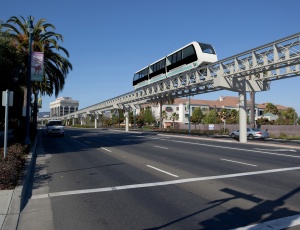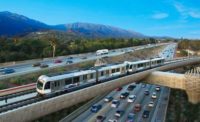Flatiron/Parsons JV Awarded Contract for Oakland Airport Connector Project
A joint venture of Flatiron and Parsons, with Doppelmayr Cable Car as technology supplier and Turner Construction Co. as a major subcontractor, has been awarded a contract by the San Francisco Bay Area Rapid Transit District for the Oakland Airport Connector Design-Build/Operate and Maintain project.

More than 25 years in planning, the $361-million automated people mover project will provide a 3.2-mi connection between the Coliseum BART Station and the Oakland Airport. The Flatiron/Parsons Joint Venture will design and construct the fixed, elevated guideway and Doppelmayr will supply the Automated People Mover technology, as well as operate and maintain the system for up to 20 years.
�Flatiron is proud to be leading this project,� says Curt Weltz, president of the company�s Western Region. �Because of the local unemployment environment, we recognize the importance of not only delivering a high-quality transit project, but also of helping to create employment opportunities in Oakland and surrounding communities.�
Once built, the connector will replace the AirBART busses that often are often held up in traffic. The APMs will offer swift, reliable service because they will be run on a fixed, elevated guideway above the congestion. The APMs will arrive at the Coliseum BART Station every 4.5 minutes and will quickly transport air travelers to the airport in about 8 minutes with an on-time performance exceeding 99%.
Tom Barron, Parsons Group president, says that �Parsons is pleased to continue our nearly 50-year participation in Bay Area transit planning, design, and construction. Like many people in the region, we have been waiting for this project for a long time. It will be a great benefit to BART and the Oakland Airport.�
�Cable-driven urban transportation has a long and rich history in the Bay Area,� says Doppelmayr Cable Car CEO Stephan Wabnegger. �We look forward to adding BART OAC to our growing list of world-class cable propelled APMs.�
�Turner is proud to be part of another project that will serve the local community and visitors to the city of Oakland,� says Turner�s senior vice president, Michael O�Brien.
Construction is expected to begin in late this year and take 3.5 years to complete.
Last July, the BART Board reaffirmed its commitment to building the project despite having the Federal Transit Administration withdraw some $70 million in federal stimulus funds, citing Title VI deficiencies.
In order to replace the $70 million, the board approved the new funding package in a vote of 8 to 1. The plan now consists of $8 million in project cost reductions and $62 million in funding from a variety of sources including state transportation funds, the BART SFO Reserve Account, the High Speed Passenger Train Bond and borrowing additional funds from the Transportation Infrastructure Finance and Innovation Act, a low interest federal loan.
According to BART, the project is expected to create between 2,500 and 5,000 direct and indirect jobs during the 3.5-year construction phase.





